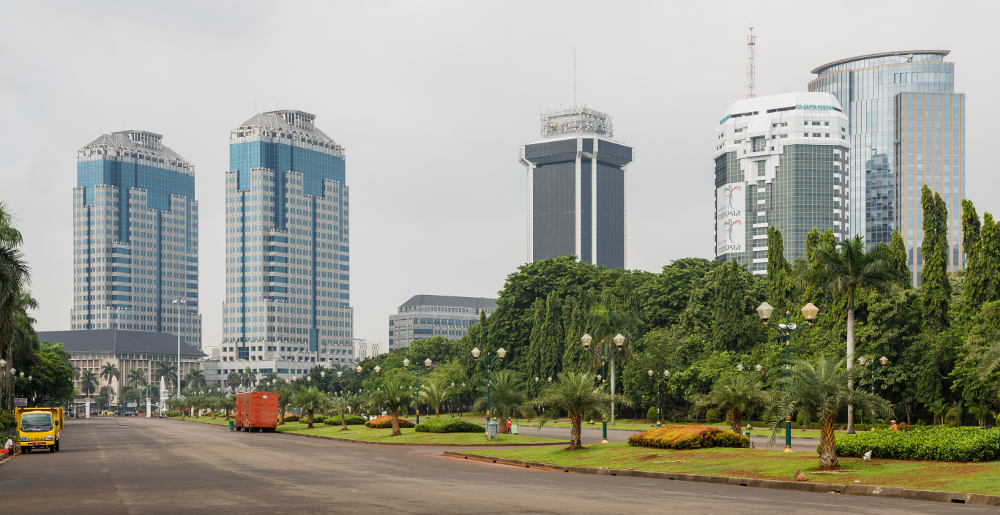JAKARTA, Indonesia (ViaNews) – On April 17, Indonesians cast their votes in the country’s biggest election as they elected president and vice president as well as legislative candidates at national and regional levels.
As the vote counting process is still ongoing, the real count from the General Election Commission (KPU) as of April 20 (12.43 pm Western Indonesia Time), Joko Widodo-Maruf Amin pair has won 54.88 percent and challenger Prabowo Subianto-Sandiaga Uno 45.12 percent, based on 4.6 percent of the votes counted.
While six credible pollsters showed that the incumbent Joko Widodo and his running mate has led by gaining more than 53 percent of the votes counted.

Central Bank of Indonesia (left side). In the middle: Kantor Pusat PT Indosat, the headquarters of the major telcommunications operator. At the right side (frontbuilding): Sapta Pesona Building (Ministry of Tourism and Creative Economy Campus). Image by: CEphoto, Uwe Aranas
Markets responded positively to the election’s preliminary result. The Jakarta Composite Index(IHSG) closed at 6.507.221 on Thursday, or up 0.40 percent, according to the Indonesia Stock Exchange (BEI).
While the Indonesian Rupiah gained 0.53 percent to Rp 14.010 against U.S dollar a day after the poll, as Bloomberg data reported.
The Rupiah is predicted to strengthen by reaching below Rp 14.000 to the U.S dollar or at least stay at that level until the second semester of 2019.
DBS Bank economist Masyita Crystallin explained that markets are usually feeling more optimistic after the election.
“This is normal and expected, can be half the Rupiah’s upside that is already predicted,” she said.
International financial institution Morgan Stanley also responded to the latest development of Indonesia’s election in its report quoted on Thursday (4/18). It claimed that the unofficial result is minimizing the political uncertainties and indicating that the continuation of the government’s policy.
According to Deyi Tan from Morgan Stanley Asia Ltd, the focus will turn to the policy implementation after the official result of the election is announced.
What has the Joko Widodo administration achieved?
Two months before the election, Coordinating Minister for Maritime Luhut Panjaitan claimed that the Joko Widodo-Jusuf Kalla administration has controlled the inflation rate during its four-year period in office.
The inflation average under Jokowi was still above 3.5 percent below the government’s estimate. In 2013, the inflation rate hit around 10-11 percent.
But, after 2015, the inflation rate tended to be lower than the expected outlook. Even in 2018, the inflation rate stood at 3.13 percent.
Also, Indonesia is the world’s second best country to offset the global meltdown behind India, driven by Indonesia’s domestic consumption, as Coordinating Minister for Economy Darmin Nasution said.
Morgan Stanley also highlighted the Jokowi administration’s achievement in infrastructure development. It is known the government’s spending on infrastructure rose significantly from 1.8 percent of the GDP in 2013 to 2.8 percent of the GDP in 2018.
The infrastructure development has helped to boost Indonesia’s global competitiveness ranking. In 2017, Indonesia’s ranking jumped five places from 36th to 41st.
Morgan Stanley concluded that the current administration managed to shorten the maximum time needed for land release from 518 days to 400 days.
From the revenue’s perspective, Morgan Stanley hailed the government’s tax amnesty program in 2016 and Jakarta’s steps to simplify tax regulation and increase state-owned enterprises dividends to boost revenue.
What’s next for the newly-elected president?
The newly-elected president and vice president, after the announcement of the election’s official result by the KPU, must be ready to handle these three main areas:
- 1) Trade deficit: Indonesia’s trade balance is predicted to suffer from deficit throughout this year due to the pressure on the country’s export and import as the impact of the global meltdown. In January 2019, the trade balance has recorded a deficit of $ 1.16 billion
The consistent import of consumption goods indicates that Indonesia is still unable to fulfill domestic needs caused by the shift towards the service sector. The consumption goods’ import has reached 9 percent in the last three years, as Indef Senior Economist Nawir Messi told Kontan.
- 2) Manufacturing industry: Manufacturing industry’s performance declined in the 2015-2018 period. In 2018, this sector accounted for only 19.86 percent of the country’s GDP.
The decline in the manufacturing sector was linked with the trade balance deficit. In 2018, Indonesia’s trade balance recorded a deficit of $ 8.54 billion, the worst in history.
- 3) Boost Indonesians’ purchasing power: The government must be able to maintain people’s purchasing power, given that Indonesia’s economic growth heavily relies on domestic consumption.
Despite the lower inflation rate, the purchasing power is still stagnant at 5 percent. Last March, the inflation rate stood at 2.48 percent year-on-year, said Eko Listiyanto from Indef.






